
I'm happy because I won't have to train again, or travel or sit






"I'm happy because I won't have to train again, or travel or sit in team hotels." Thus spoke Romário, warrior of the football field, whose boots once thundered with glory but who, in these words, revealed the other face of greatness. His declaration is not of laziness, nor of disdain for his craft, but of relief at being released from the endless burdens that accompany triumph. For behind the brilliance of the athlete lies a life of discipline, repetition, and sacrifice, a life where freedom is often surrendered in exchange for victory.
The ancients too knew this paradox. The soldier who fought bravely longed for peace at home. The sailor who conquered the seas yearned for the quiet of his own hearth. The gladiator, cheered by thousands, still prayed for the day he would no longer feel the weight of the sword. Romário’s joy at leaving behind the training, the travel, the team hotels is of the same kind—it is the sigh of the warrior who has completed his duty and can at last lay down his armor.
To the world, the game is glory, but to the player, it is also burden. Training grinds the body, travel wears the spirit, and long stays in impersonal hotels take away the warmth of home. Even in the midst of fame, there is exile. Romário’s words expose the truth that every triumph demands hidden costs, and that freedom, once regained, can bring greater joy than medals or applause.
Consider the tale of George Washington, who after leading his army to victory in the American Revolution, refused the crown and retired to his farm. He was honored as a hero, yet his truest joy lay in tending fields, walking his land, and knowing he no longer had to bear the endless weight of leadership. His peace, like Romário’s, was found not in further conquest but in rest from duty.
There is humility in Romário’s confession. Many boast endlessly of their careers, clinging to the past glories of the field. But he admits that happiness does not always lie in striving, but sometimes in stepping away. His words remind us that even the strongest must rest, and that the end of one chapter can be the beginning of a freer, truer life. This is not weakness but wisdom: to know when to withdraw, when to give the body and the spirit the gift of peace.
O children of tomorrow, hear this: greatness is not only in victory but also in knowing when to lay down the struggle. Do not fear the end of a season, nor mourn the closing of a chapter. For every ending brings the chance to rediscover yourself—not as the world demanded you to be, but as you are in your own truth. Learn from Romário: even a champion can long for simple happiness, for freedom from the relentless march of duty.
Therefore, honor your labors, but also honor your rest. Work with discipline, strive with courage, but when the time comes, do not be ashamed to rejoice in release. Make peace with endings, for they too are victories—the victories of the soul over weariness, of the heart over endless striving.
Thus the teaching of Romário endures: that happiness is not always found in applause, but sometimes in silence. Not always in the battlefield, but sometimes in the home. Not always in the endless chase of greatness, but in the freedom to rest, to live, and to simply be.






AAdministratorAdministrator
Welcome, honored guests. Please leave a comment, we will respond soon